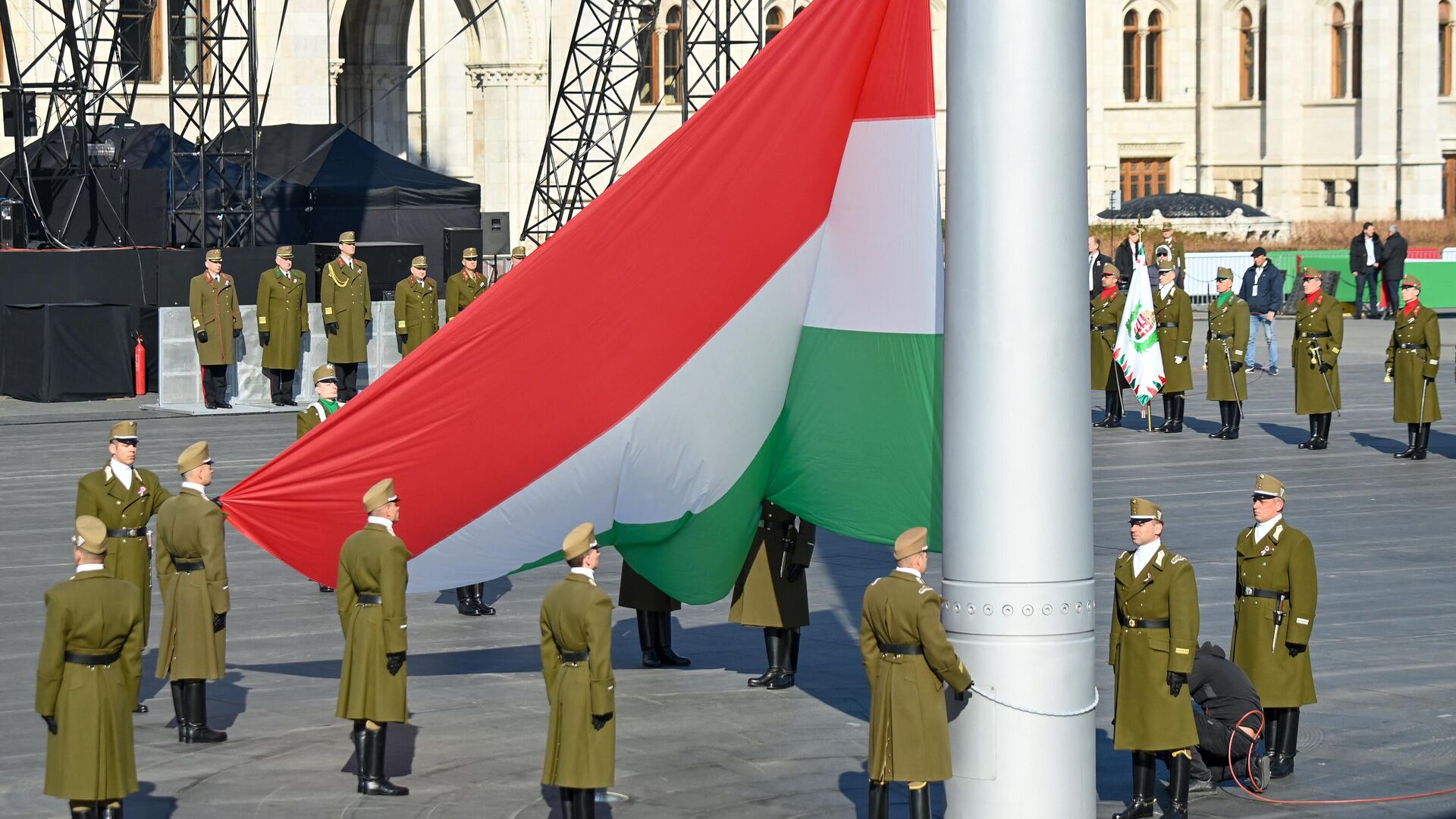https://sputnikglobe.com/20230218/another-cylinder-to-economic-engine-hungary-germany-seeking-to-bolster-defense-ties--1107568516.html
‘Another Cylinder to Economic Engine’: Hungary, Germany Seeking to Bolster Defense Ties
‘Another Cylinder to Economic Engine’: Hungary, Germany Seeking to Bolster Defense Ties
Sputnik International
Berlin and Budapest have repeatedly locked horns over the latter’s alleged rule of law-related erosion, which doesn’t prevent German companies from continuing to make direct investments into the Hungarian economy
2023-02-18T11:25+0000
2023-02-18T11:25+0000
2023-02-18T11:25+0000
world
hungary
germany
defense
cooperation
economy
https://cdn1.img.sputnikglobe.com/img/07e7/02/12/1107573159_0:160:3073:1888_1920x0_80_0_0_8d679b2402d245048e30e167ba594d2c.jpg
Hungarian Prime Minister Viktor Orban’s government is seeking to deepen defense cooperation with Germany as he looks to turn his country into a weapons hub, a US media outlet has reported.According to the outlet, the German company Rheinmetall AG is building three factories in Hungary to manufacture tanks, ammunition and explosives.Hungarian Defense Minister Kristof Szalay-Bobrovniczky, for his part, told reporters that "the defense industry will add another cylinder to our economic engine, similar to what we have already accomplished in other parts of the economy such as the car industry.”He spoke as Rheinmetall AG was cited by the outlet as saying that it is investing "three-digit million euros" in Hungary as the company, which is maker of the Leopard tank, plans to expand its footprint in Europe.One Rheinmetall factory will produce the Lynx armored infantry vehicle, of which Hungary has ordered 218, according to the outlet.It quoted Tamas Varga Csiki, an analyst at the Budapest-based National Public Service University’s Defense Institute, as saying that “at the end of the day, German politicians are happy when their businesses are happy.”The developments come as Berlin and Budapest remain at odds over an array of pressing political issues, including the Ukrainian conflict. Berlin is frustrated about Orban’s refusal to provide Kiev with weapons and his criticism of Germany’s decision to send the Leopard 2 tanks to Ukraine. On the other hand, both sides continue to develop economic partnership, with German companies’ direct investments into the Hungarian economy on the rise.
hungary
germany
Sputnik International
feedback@sputniknews.com
+74956456601
MIA „Rossiya Segodnya“
2023
Oleg Burunov
https://cdn1.img.sputnikglobe.com/img/07e4/09/0b/1080424846_0:0:2048:2048_100x100_80_0_0_3d7b461f8a98586fa3fe739930816aea.jpg
Oleg Burunov
https://cdn1.img.sputnikglobe.com/img/07e4/09/0b/1080424846_0:0:2048:2048_100x100_80_0_0_3d7b461f8a98586fa3fe739930816aea.jpg
News
en_EN
Sputnik International
feedback@sputniknews.com
+74956456601
MIA „Rossiya Segodnya“
Sputnik International
feedback@sputniknews.com
+74956456601
MIA „Rossiya Segodnya“
Oleg Burunov
https://cdn1.img.sputnikglobe.com/img/07e4/09/0b/1080424846_0:0:2048:2048_100x100_80_0_0_3d7b461f8a98586fa3fe739930816aea.jpg
investments into the hungarian economy, hungarian prime minister viktor orban’s government, defense partnership between berlin and budapest
investments into the hungarian economy, hungarian prime minister viktor orban’s government, defense partnership between berlin and budapest
‘Another Cylinder to Economic Engine’: Hungary, Germany Seeking to Bolster Defense Ties
Berlin and Budapest have repeatedly locked horns over European allegations that the rule of law is eroding in the EU member state; however, this hasn't prevented German companies from continuing to make direct investments into the Hungarian economy.
Hungarian Prime Minister
Viktor Orban’s government is seeking to deepen defense cooperation with Germany as he looks to turn his country into a weapons hub, a US media outlet has reported.
According to the outlet, the German company Rheinmetall AG is building three factories in Hungary to manufacture tanks, ammunition and explosives.
“While initial output will go to fulfill Hungarian orders that predate the war to upgrade the local military’s Soviet-era equipment, it also lays the groundwork for a nascent Hungarian defense industry that Orban soon hopes to become a key arms exporter,” the outlet argued.
Hungarian Defense Minister Kristof Szalay-Bobrovniczky, for his part, told reporters that "the defense industry will add another cylinder to our economic engine, similar to what we have already accomplished in other parts of the economy such as the car industry.”
“I only hope that it improves the German-Hungarian relationship even further,” he added.
He spoke as Rheinmetall AG was cited by the outlet as saying that it is investing "three-digit million euros" in Hungary as the company, which is maker of the Leopard tank, plans to expand its footprint in Europe.
“The willingness of both sides to jointly develop a long-term strategy and partnership is equally relevant,” the firm said, referring to its collaboration with Budapest, which reportedly co-financed the Rheinmetall plants for an undisclosed sum.
One Rheinmetall factory will produce the Lynx armored infantry vehicle, of which Hungary has ordered 218, according to the outlet.
It quoted Tamas Varga Csiki, an analyst at the Budapest-based National Public Service University’s Defense Institute, as saying that “at the end of the day, German politicians are happy when their businesses are happy.”
“Like car manufacturing, the defense industry will be another form of insurance to prevent political differences from fundamentally undermining the Germany-Hungary relationship,” he claimed.
The developments come as Berlin and Budapest remain at odds over an array of pressing political issues, including
the Ukrainian conflict. Berlin is frustrated about Orban’s refusal to provide Kiev with weapons and his criticism of Germany’s decision to send the Leopard 2 tanks to Ukraine. On the other hand, both sides continue to develop economic partnership, with German companies’ direct investments into the Hungarian economy on the rise.



